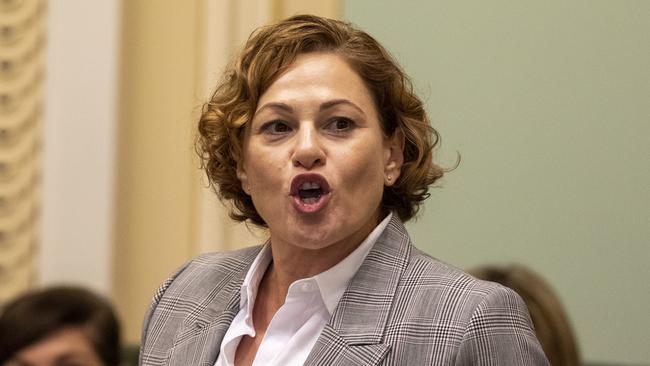Jackie Trad anti-debt fund figures don’t tally up
Queensland’s public service super defined benefit liability soared by $1.1bn before Jackie Trad announced that the fund would be targeted to pay down debt.

Queensland’s public service superannuation defined benefit liability soared by $1.1bn and its surplus shrank before Treasurer Jackie Trad announced that the fund would be targeted to pay down the state’s debt.
Ms Trad used December’s mid-year fiscal and economic review to announce a $5bn Queensland Future Fund, with the cash to be taken from the defined benefit fund’s $7bn surplus and reinvested, and the proceeds used to reduce debt.
But Auditor-General Brendan Worrall’s examination of the state’s 2018-19 finances warns that the calculation of the size of the defined benefit fund liability — and the corresponding surplus — is “highly sensitive” to changes in accounting assumptions.
On a “funding basis”, used by State Actuary Wayne Cannon to review the defined benefit fund, the surplus was calculated at $7.3bn. But on an “accounting basis” — the method used in the rest of the government’s financial statements — the surplus was much smaller, just $920m.
Former federal Treasury economist Gene Tunny, director of Adept Economics, said the Auditor-General’s report showed Ms Trad’s “future fund” debt- reduction plan was “not as prudent as it should be”.
“It’s obvious to me (reading the Auditor-General’s report) that they’ve based a policy decision upon the most optimistic calculation of the value of that future liability, they’ve based it on an optimistic assessment of how much money they need to set aside to meet that future liability,” Mr Tunny said.
“It emphasises the need for the government to come up with a genuine debt reduction plan over the medium to long term, rather than just this future fund, which is just moving money from one spot to another and not really solving the problem in the long term.”
Queensland’s total government debt is forecast to exceed $91bn by 2022-23.
Mr Worrall said that in 2018-19 the superannuation liability increased by $1.1bn, and by mid-last year was $26bn. The value of the long-term assets, held in unit trusts managed by the Queensland Investment Corporation, was $29.35bn.
Queensland is the only state to have fully funded its public service superannuation liabilities, allowing it to take the surplus assets to prop up its budget bottom line by building infrastructure and paying down debt.
Even if the fund slips into deficit, the superannuation payouts of the scheme’s 68,000 public servant members will not be affected because they are guaranteed. That means the government is required under legislation to fully fund the scheme, so would have to top it up.
Mr Worrall said the value of the assets had “steadily decreased” since 2014-15, in the final months of the Newman Liberal National Party government and the first six months of the Palaszczuk Labor government.
“This is due to the government’s use of surplus assets to reduce debt and payments made to employees receiving their superannuation entitlements,” Mr Worrall said. “The value of the assets held can also be impacted (both positively and negatively) by movements in the market value of the underlying investments held by QIC Limited.”
Ms Trad has staunchly defended the creation of the future fund — which must be established by an act of parliament — as “responsible budget management” developed with the guidance of the independent ratings agencies.




To join the conversation, please log in. Don't have an account? Register
Join the conversation, you are commenting as Logout